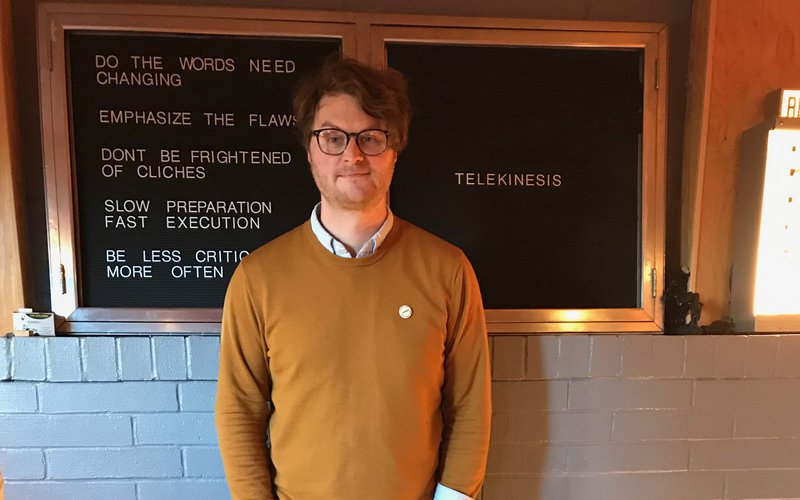
On a letter board in his West Seattle home studio, Michael Benjamin Lerner (known musically as Telekinesis) has posted a series of "Oblique Strategies," a card-based method for promoting creativity devised by musician Brian Eno and Peter Schmidt back in 1975. Among the phrases: "Don't Be Frightened Of Clichés."
"They're like a deck of cards, basically, and when you're recording and you're stuck, you grab one, and that would have been one that you grab," Lerner explains. "I have it up here all the time because I think it's really important to remember that you just got to do whatever you want to do. That's why I got into making music in the first place: there's no rules. So no one's going to tell me that it's cliché until someone later on down the road is reviewing the record. And that doesn't bother me because I don't read any of that stuff anyway."
Not that Lerner's reading, but the reviews for his fifth and most recent album Effluxion have been, well, effusive. While previous albums were produced by Death Cab for Cutie's Chris Walla or Spoon's Jim Eno, this is the first time he's self-produced his own album. In this segment for KEXP's Sound & Vision, Lerner shares the songwriting process with Morning Show Producer Owen Murphy for the track "Set a Course" (which was a Song of the Day pick back in January).
"Yeah, the chords never change. Which is also kind of the magic trick in songwriting that I think I forget about. So many times when I'm writing I'm like, I've got to hit a home run and you got to get this giant chorus in there that is like the 'money maker' or whatever people say, you know, and sometimes it's just about adding and subtracting a bunch of stuff and the chorus has become choruses just by doing that. And that's a big trick. I think that was used a lot, like in '90s guitar rock. I was just listening to that Blur song "Song 2" with the "woohoo." Same thing over and over again but they just add and subtract or put a distortion pedal on at certain points. And it's such a great song, you know."
"A lot of times I'm always trying to find this chorus because that's usually so satisfying. But in this one, I didn't ever find that. So yeah, I took the ingredients of quiet-loud quiet-loud, you know which, when in doubt, is the greatest thing to do"
"I was lost / I was found / Well now just look at me."
"I think everyone feels that way at times in their life. You know, maybe you lost your job or lost a significant other. You get lost in your life and you don't know what's going on until you become found again and then everything is clear and normal. Yeah, a lot of times when I'm writing lyrics, it's just whatever comes off the top of my head and I don't remember what it specifically means a lot of the time. I think it's cool because other people interpret it however they want."
Are lyrics important to you?
"Yeah, definitely, but I don't think I labor over them as much as a lot of people do. My whole thing is everything should be to the point in the moment. So I just write it down and then I don't ever go back and fix it. A lot of people go back and fix it. I don't like to do that."
Listen to the segment below, and stay tuned at the end to hear a second version of the song with Matthew Caws of Nada Surf.
Sound & Vision airs Saturday mornings at 7 AM PST. Hosted by Emily Fox and John Richards, the show "uses interviews, artistry, commentary, insight, and conversation to that tell broader stories through music, and illustrate why music and art matter."